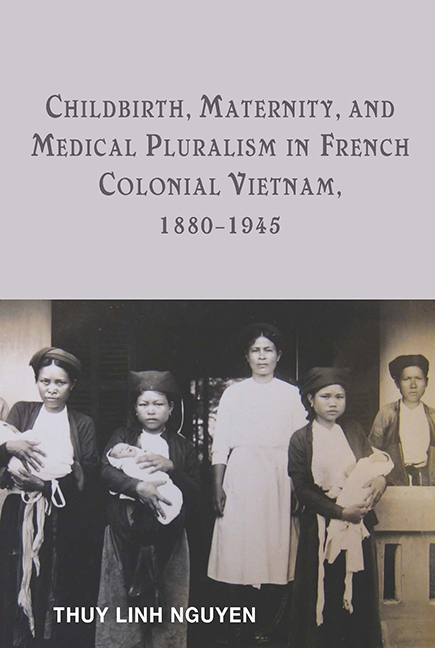Book contents
- Frontmatter
- Contents
- List of Illustrations
- Acknowledgments
- Introduction
- 1 The First Encounters
- 2 Maternity Hospitals
- 3 Colonial Midwives
- 4 The Bà mụ and Childbirth Pluralism
- 5 Scientific Motherhood and the Teaching of Maternity
- 6 The Depression Era and the Discovery of the Child
- Conclusion
- Notes
- Bibliography
- Index
6 - The Depression Era and the Discovery of the Child
Published online by Cambridge University Press: 13 July 2019
- Frontmatter
- Contents
- List of Illustrations
- Acknowledgments
- Introduction
- 1 The First Encounters
- 2 Maternity Hospitals
- 3 Colonial Midwives
- 4 The Bà mụ and Childbirth Pluralism
- 5 Scientific Motherhood and the Teaching of Maternity
- 6 The Depression Era and the Discovery of the Child
- Conclusion
- Notes
- Bibliography
- Index
Summary
The Great Depression in the early 1930s had a devastating impact on France and its colonies. After two decades of economic boom from World War I to 1929, Indochina fell into a severe social and political crisis that posed a serious challenge to colonial rule. The situation worsened in Tonkin, where overpopulation combined with natural disasters imposed enormous pressure on its fragile economic foundations. Vietnamese working-class families bore the brunt of famine, food deprivation, and the lack of necessities. Children, one of the most vulnerable groups in times of economic hardship, also suffered badly from starvation and malnutrition. The deterioration in the physical health of Vietnamese adults and children caused great concern among French administrators since the declining health of indigenous workforce threatened to derail colonial projects in the whole region. It also undermined the ideological goal of the French mission civilisatrice that was built on the application of French scientific and cultural values in the creation of economic and social advances in the colonies. Increasing problems with the laboring class in Vietnam coincided with the rising movements of social hygiene and pronatalism in interwar France that emphasized the linkages between children's health, labor, and the future of France and its empire.
The socioeconomic crisis in Vietnam and reverberations from metropolitan discourses led to an outpouring of interest in the fate of the child. Social and medical processes in France and Europe provided a context and served as a model for several policies toward children in the colony. Vietnam in this context was neither “the laboratory of modernity” where the colonial state experimented with progressive and reformist ideas considered too radicalized to be implemented in Europe, nor was it a “premodern” and “backward” society viewed as ill-suited for the contemporary social agenda from the metropole. In fact, the global forces of the Great Depression presented both metropolitan and colonial governments with similar challenges and demanded the same kind of social reforms. As a result, in the 1920s, just as the Third Republic extended its authority over maternal and child welfare in France, the colonial state in Vietnam created Assistance Sociale, an official agency in charge of providing social assistance to underprivileged groups including indigenous children and mothers. As daycare nurseries mushroomed in industrial regions of northern France, similar childcare institutions also multiplied in Vietnam as a result of the state's renewed interest in maternal and infant welfare.
- Type
- Chapter
- Information
- Publisher: Boydell & BrewerPrint publication year: 2016



